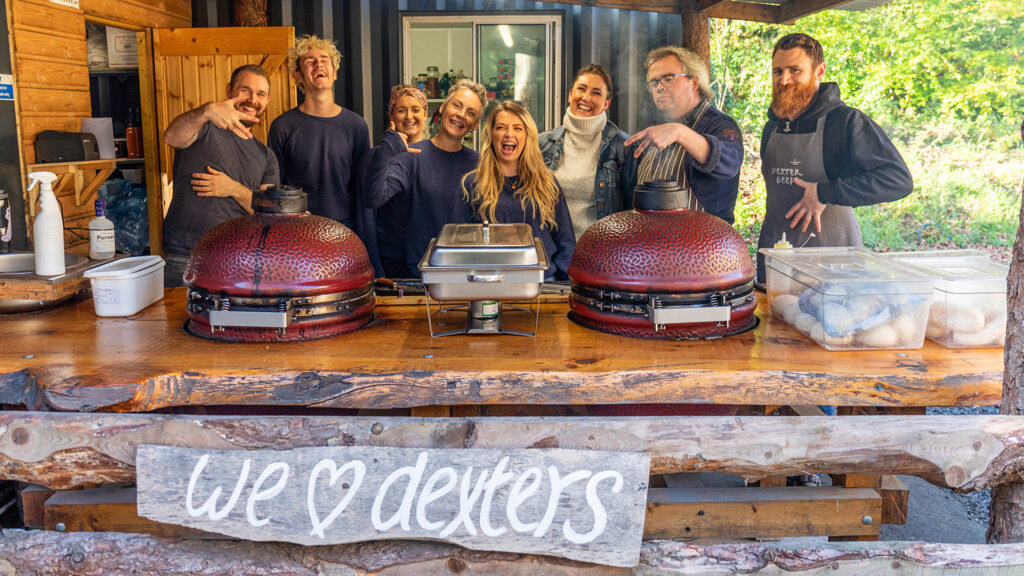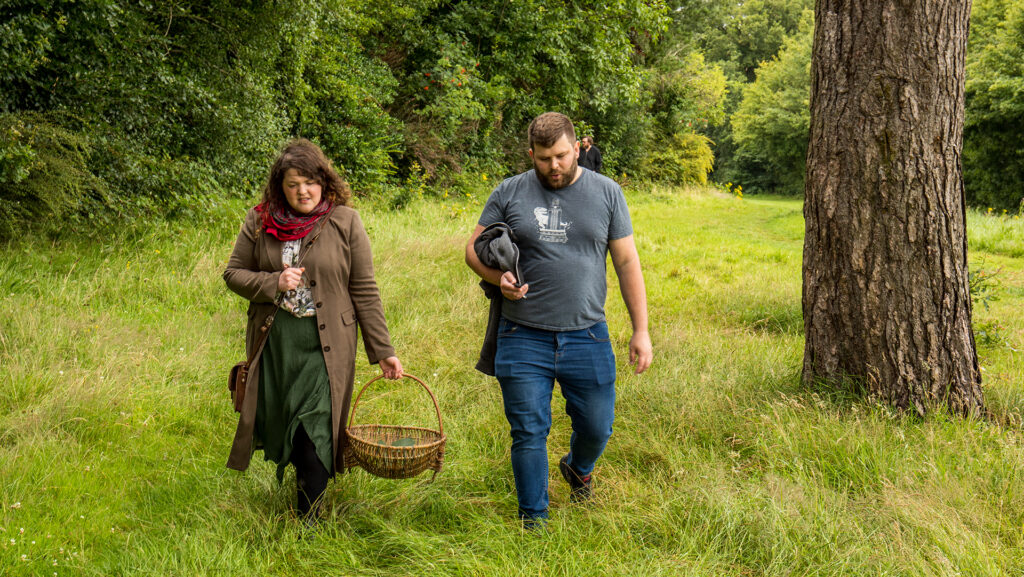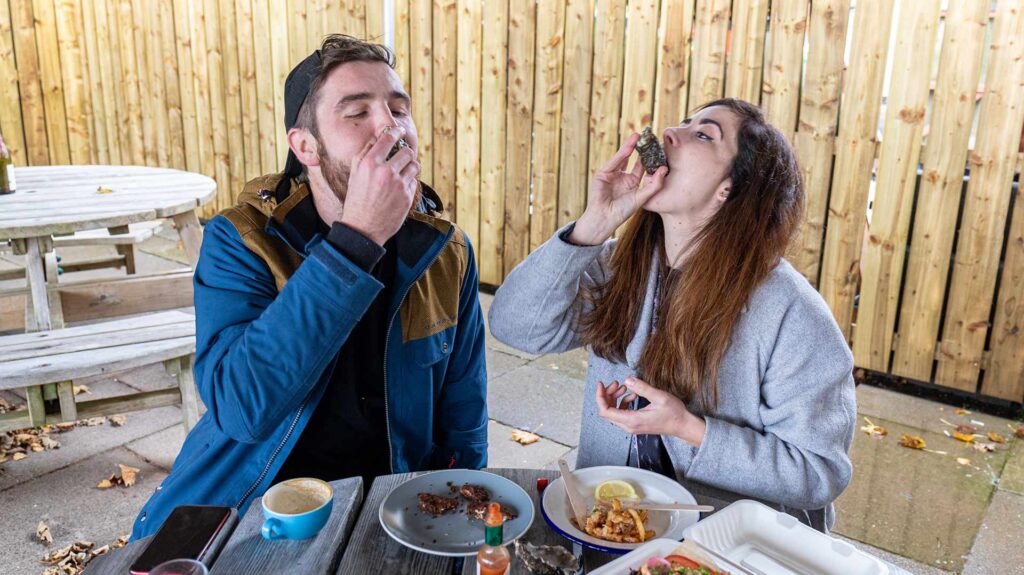Michael Avila describes himself as a journalist with a travel problem. I’d say he’s one of Northern Ireland’s most fascinating imports.
Originally from California, Michael moved to Northern Ireland in 2016 to study at Queen’s University and decided to stay. By day he works in peace building and conflict transformation. The rest of the time, as well as being Northern Slant’s Community Editor, he’s devouring the best food and drink NI has to offer and sharing the stories of the people behind them.
Together, Michael and friends Maciek Bator from Poland and Scott Edgar from Northern Ireland, set up The Underbelly project to build a vibrant online community around NI’s local food and drink industry.
From Belfast’s Vietnamese Coffee Co to Zac’s Bakehouse, whose bread is found in independent businesses across NI, they’ve met with some of our food and drink industry’s finest.
“We’ve all done our fair share of eating, drinking, travelling and working as bartenders, servers and DJs in precarious places around the world,” said Michael. “I think this commonality is what brought the three of us together to form The Underbelly.”
So, what have Michael and his team learned? And how does NI’s food and drink compare to his native US and the rest of the world? I spoke to Michael to find out more.

The Underbelly met with family-run Fodder in County Down
Why did you start the The Underbelly project?
Prior to moving to NI and pursuing work in the community sector, I had a long tenure working in a wide variety of restaurants and bars across the United States and the island of Ireland. Though I don’t personally miss working in restaurants, I do miss the camaraderie that comes with it.
One day I said to Maciek, “There is great food and drink in Northern Ireland. There’s also world-renowned travel destinations. But nobody is combining the two.” Our Underbelly journey started right there.
We have world-class ingredients here that simply aren’t found anywhere else. It’s this that we feel Northern Ireland should be immensely proud of, yet arguably hasn’t received the attention it deserves from the tourism sector.
Tell me three things that you’ve learned so far. Has anything surprised you?
I’ve been surprised by the inaccessibility of seafood. There isn’t a single person we’ve interviewed that hasn’t complained about this. As mostly foreigners (sorry, Scott), we can’t get our heads around how an island with some of the best fishing reserves in the world isn’t offering top notch seafood on every corner. Luckily, this is changing, which we learned in our interview with Native Seafood & Scran.
The pandemic McDonald’s lines and devotion to American-style fast food and chain restaurants is astounding. While America has long had a fast food and themed restaurant addiction, we’ve seen a local food and drink revolution over the past 15 years. I’d say NI is at the beginning of this process now; I hope we can strike a balance between the American and continental European approach to food – valuing tradition with an open mind.
Stories matter. While perhaps NI’s palate needs some work, its storytelling certainly does not. Yes, to have a successful restaurant, bar, brewery or bakery you need to have good food, drink and service, but I don’t think that’s enough for most people here.
We’ve noticed that those finding the greatest success come with a great story that builds a community around what they are accomplishing. I think this is unique to this island and is why I believe so much in what the next decade will bring to NI’s culinary scene.
Describe the NI food and drink industry in 3 words.
Mash, roasties, champ.

Michael met with forager Clare McQuillan at Belfast’s Ormeau Park
How does food and drink here compare to that of elsewhere – and the USA?
What NI does, it does extremely well. From what it offers – which is a hell of a lot for a tiny place – it does better than ‘the average’ in the States and on par with anywhere else in the world. And I mean that sincerely.
NI has some of the best dairy products, beef and lamb, beer, whiskey and gin found anywhere, and arguably the best seafood. So its ‘average’ indigenous products are much higher quality than the US, and its high-end stuff is truly phenomenal. It’s that ‘cheerful’ middle ground – places like Bia Rebel Ramen, The General Merchant and Reggie’s Pizza where you can get top notch food for a normal, ‘everyday’ price – that Northern Ireland needs more of. It’s slowly but surely getting there.
I miss the diversity of food that the States and other places have to offer, but that is also changing as NI becomes more diverse.
The COVID-19 pandemic has been a difficult time for a lot of food and drink businesses. What are your thoughts on the future of food and drink in NI?
All I can say is support them. To me, this issue is two-pronged:
Firstly, we should do all that we can as a society to protect the places we love to frequent and eat. It looks like the pandemic is going to be with us for some time. I hope that both civil society and the government can come together to find a fair and sustainable solution. Without support, the immediate future looks dim for the hospitality sector.
Secondly, restaurants, bar owners, distillers and farmers will need to adapt. We’ve seen this so far in our interviews. The likes of Fodder, The Morning Star, Karri Kitchen and Farm Next Door have come up with so many creative ways to keep serving their customers. Together with proper support, grit, personality and creativity will get us through this period.

Rebekah and Stevie McCarry at Native Seafood & Scan, Coleraine
Should Northern Ireland be proud of its food?
If you go to Italy, or Spain, or Vietnam and complain about their food, you’ll be lucky to make it out alive. Northern Ireland should take that same pride in its food. Perhaps for certain historical reasons, this island hasn’t had a traditional ‘food culture’. To us, we don’t see this as a bad thing, as we can make it into whatever we want it to be now. The issue has always been getting locals to cherish and embrace local ingredients the way they should be. If we can do that, we can overcome anything as a society. And that’s why we’re here!
You can visit The Underbelly here and find them on social media:
Instagram: @theunderbellyco
Twitter: @theunderbellyco
Facebook: https://www.facebook.com/theunderbellyco
Also published on Medium.
